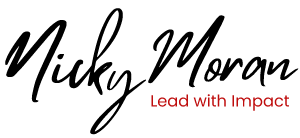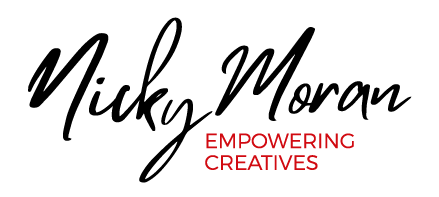“So what do you do?”
It was the question I always dreaded.
I didn’t know how to answer it. Was I a singer, performer, journalist, salesperson, traveller, international trader (buying cheep vodka and selling it for a profit)? I did so many different things.
For many creative people, it can be frustrating when you simply cannot narrow your options down to answer this question simply.
I also know how painful it is when you’re not clear. ‘What we do’ is connected with who we are. As creatives, our work expresses our personality, our passions – so when our identity isn’t clear, it can affect our confidence.
So, as a classic, multi-passionate person, I hope my story will inspire you to find more clarity in your identity – and help you to progress your career and live to your full potential.
This is my story.
Over the years, I tried my hand at most creative professions. I was a jazz singer for a while, and dabbled in being a BBC broadcast journalist and a TV researcher. For a couple of years I had a job working in PR for a pop music education company, but whenever people asked me what I did for a living, I always felt like a fake.
I sometimes said I was a singer, a journalist, a traveller. At one point, I saw a gap in the market and decided to teach flirting skills. I could hustle, PR myself, get in the newspapers and persuade people to buy my ideas. I could survive and thrive with my ability to get and create work.
But I still struggled to answer the question: “What do you do?” because it forced me to ask: “Who am I exactly?”
Not feeling congruent with the answer to that question had a huge impact on my self-confidence.
Over the years, I grew tired of the hustle – the feeling that I was lying to myself. I decided that, to have an income and an identity that I felt proud of, I had to learn to do two things:
- Get clear on who I was and what I wanted to be in the world.
- Commit to it.
It didn’t happen overnight, but I did discover some things that helped me get clear.
It was at a personal development course that someone asked me for the first time: “What do you really want?”
That question shook me. I’d never been asked before. I had always assumed what I wanted wasn’t possible.
In a shaky voice I said: “I think I want to be an actor.” A flush of excitement came over me. I’d never admitted that to myself before.
So I gave up a steady job in PR and moved to London to pursue this new career.
However, once I got to London and met a few actors, I realised that I actually didn’t want to be an actor. For a start, I learnt that I was hopeless at learning lines. I also learnt that an actor’s life was about putting life on hold in case an audition came up. It meant waiting for the phone to ring and, most of the time, being rejected. I soon realised that I was the sort of person that needed to be proactive and in charge rather than waiting for someone to choose me. I wasn’t suited to the profession, even though I liked acting itself.
Realising all of this was a complete relief. It gave me permission to scratch it off my list. I no longer lived with a ghost of ‘what if’ – I had the headspace to focus my attention on doing something that I was willing to commit to.
After that I thought I wanted to work in TV as a presenter. I went around the BBC, knocking on doors and doing jobs as a researcher here and there. But a similar experience ensued. As I sat in a hectic, windowless studio one day, I suddenly wanted to run away. I realised that I was someone who loved freedom and being my own boss. I hated taking orders from producers. I didn’t want to be stuck in a confined space with no access to natural light. If this was working in TV, I knew that it wasn’t for me.
But it was working in the medium of TV that helped me to discover what I really wanted.
One day, while working at the BBC on a team called ‘Making it Happen’, I met a guy who popped in to run a workshop teaching improvisation skills. I asked him about his work and his life and as he spoke, I suddenly realised he was doing the job and had the life that I longed for. He was a freelance trainer and coach. He popped in, got paid for his time, uplifted the team and then went home. In that moment I knew that training people to be good communicators by using creative skills like drama was my dream profession. Sixteen years later, I have had a career that I’ve absolutely loved.
As I look back on my life, I know that I wouldn’t have discovered what I wanted without trying all the things I thought I wanted first. Sometimes you’ve got to pursue what feels right and you’ll only know through experience whether the reality matches the expectations in your mind.
The moment of clarity came after years of searching. I always kept exploring and I got there through asking myself hard questions.
We all know that creative professions are challenging. But I would say that it gets easier if you learn about who you are and what you’re really suited to doing.
For those multi-passionate people out there – don’t lose heart. Be a singer for a while, a photographer and a comedian. But get clear on which one you want to commit to – as all the creative professions are challenging. If you’re aiming for two different careers, then you’re in competition with people who are committed to one thing.
Here’s an exercise to help you get clear on what you want to commit to.
Exercise 1: Your dream profession
Close your eyes and reflect deeply on this question: if it was impossible to fail, what is it that you would love to do more than anything else?
What appeals to you about this profession?
Write a list of all the things that you think you would enjoy.
Now go out and meet people who do this work – and ask them what the profession is really like.
Exercise 2: Discover your values
Reflect on all the jobs you’ve ever done in your life. (Or that you are doing now). On the left side of a piece of paper, write down what you loved doing. What were the aspects that brought you the most joy? On the right side, write down the aspects that you hated.
The aspects on the left will reflect your values in life. My values are freedom, creativity, connecting with others, making a difference and fun. The aspects on the right will probably represent the opposite to your values.
Here is an example of mine:
Singer
Love – community, singing harmonies, music
Hate – learning lines, pressure of being on stage, the lifestyle, lack of security.
Acting
Love – the community, story telling, psychology, delving into emotions, learning about people.
Hate – learning lines, being under pressure, having to go to auditions, no security.
Radio journalist
Love – meeting new people, interviewing them, putting together a story, being heard on radio and telling people what I do.
Hate – the pressure, the hectic environment of a newsroom, editing until the early hours.
Coach for creatives
Love – meeting fascinating people, being my own boss, having creative freedom, making a difference to people’s lives, constantly learning new things,
Hate – marketing myself (but learning to love it).
There are some people that do make a success of having multi careers, but in my experience, they usually master one area before they move onto another.
There are also many creatives that spend a lifetime focusing on passion projects that are not about making money. Differentiating your passion from your work to pay the bills is a healthy choice.
And whenever anybody asks you ‘what do you do’, then I recommend that you describe the projects that light you up the most.
Most people don’t really care what you do – but if you connect with your joy and the projects that bring out your passion, then you’ll probably have a great conversation.
SaveSaveSaveSave
SaveSave
SaveSave



